Why I'm Not Using Xcode 26's AI Chat Integration (And What Could Change My Mind)
7 missing features keeping me from using Xcode's AI, plus my 5-release roadmap for Apple to catch up with Claude Code and Cursor.

I've been a bit more conservative when it comes to AI tools, not having tried Cursor when it was being hyped as I was cautious with giving AI access to an entire project. I was basically waiting for Apple's more privacy-focused solution. But when that turned out to just be ChatGPT (or other models), I figured I could also just try third-party tools. So I've been testing Xcode 26 (beta 5) against both Cursor and Claude Code since WWDC to see which can make me more efficient.
And I'm genuinely glad Apple pivoted to server-based LLMs instead of going local-only. Having seen by now how amazing Claude Code can be with the right context engineering, I know a local-only solution would have taken years to reach usable quality. Apple made the right call here to pivot from the original Swift Assist idea, but they clearly didn't have time to build a complete solution for the initial release. As someone loyal to the Apple ecosystem for development, it's frustrating to see such obvious gaps in what could be an incredible tool. So for the first time in my 14 years developer career, I'm no longer using Xcode as my daily driver.
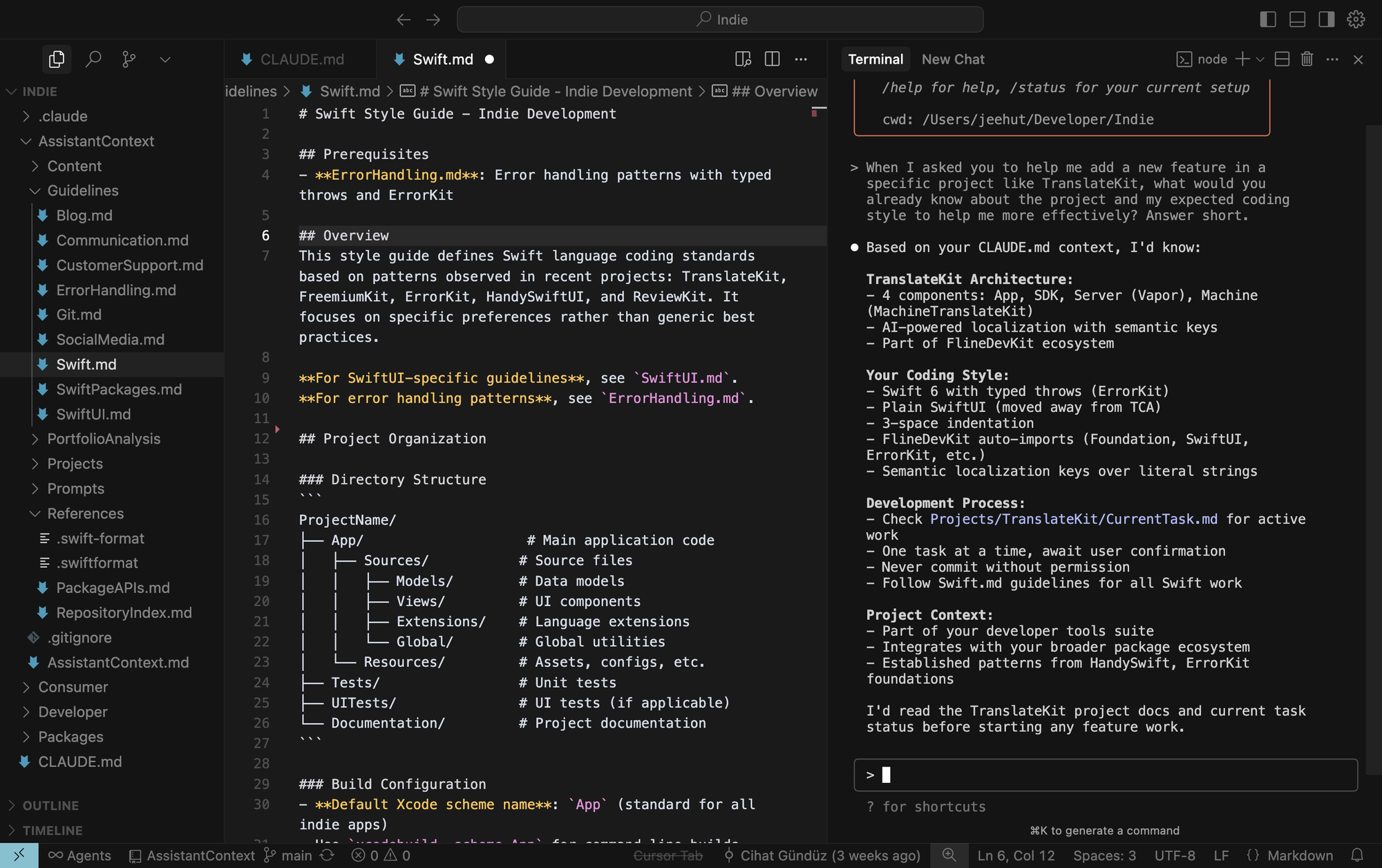
I ended up running Claude Code in Cursor's terminal instead – getting Cursor's editor awareness with Claude Code's superior tools like web search, planning mode, and the generous 5-hour usage window. I've been fully embracing the chat interface and trying to teach AI to understand how to write good code through extended context engineering (guidelines, reference documentation). Meanwhile, Xcode's AI integration – while promising due to its native IDE position – lacks fundamental features that make this kind of AI-driven development productive.
Here's what's keeping me from making the switch back to Xcode.
The 7 Missing Features in Xcode AI
1. Request queuing was the first limitation I noticed in Xcode right away. When I'm developing, thoughts and questions come fast. Having to wait for each response breaks my rhythm completely. Thinking ahead while waiting is one of the biggest time savers when working with AI. Both Cursor and Claude Code let me queue requests seamlessly, keeping me in the flow. Xcode just blocks all input.
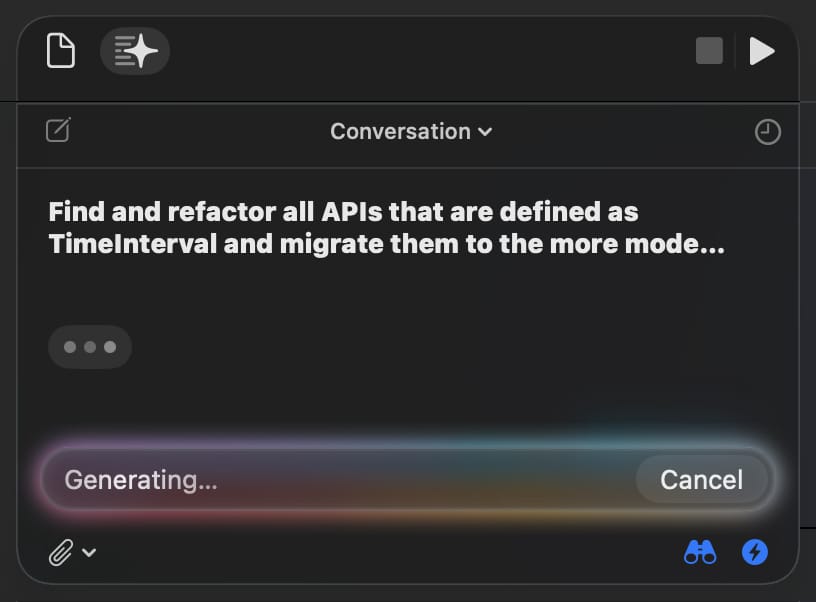
2. Context engineering support is where Xcode completely falls short. There's no support for context files like .cursorrules or CLAUDE.md. Without automatic context loading, all the work I've done on context engineering – teaching the AI my coding standards, architectural patterns, error handling approaches, and more – simply isn't possible in Xcode. I have to repeatedly explain my guidelines in every conversation. Claude Code and Cursor both automatically load my lead guideline, then understanding when to read which more detailed guideline. This transforms AI from a generic code generator into an actually useful assistant. Not in Xcode.
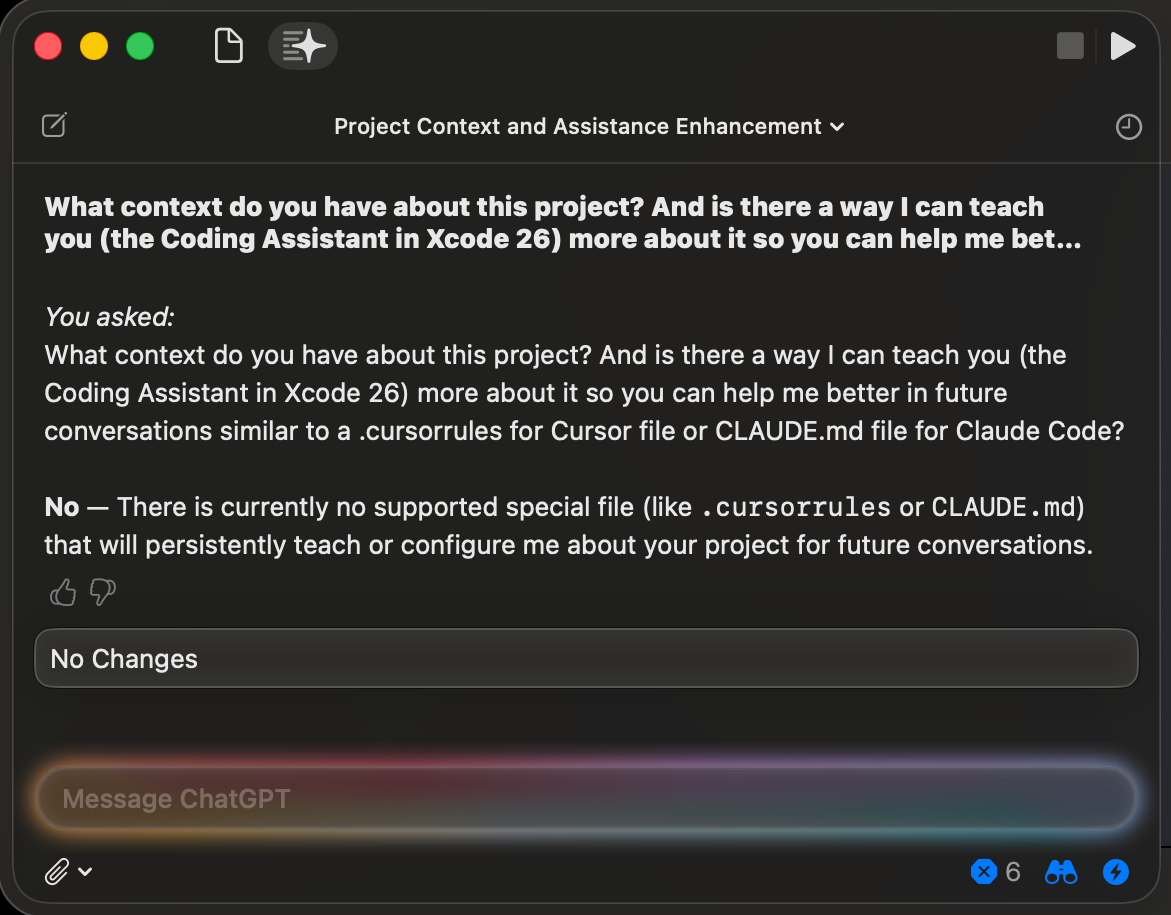
3. Build validation shows Xcode wasn't designed for AI-driven development. The AI can't validate its own code changes by running builds or even access build output when I run them. It can't even read console logs when I explicitly ask it to. Sure, Xcode lets you select an error after building and ask the AI to fix it – but that's designed for a different workflow. It's only useful when you manually write code and make a mistake, which rarely happens. But when AI writes code for me? Build errors occur constantly. Having to build myself and then manually press to fix it is super annoying. The AI should just be able to build and look at the errors itself. With Claude Code, I simply let it run xcodebuild and the AI sees all errors immediately. It does ask me for permission, but when granted, it can iterate, fix, and rebuild until everything compiles – no manual intervention needed.
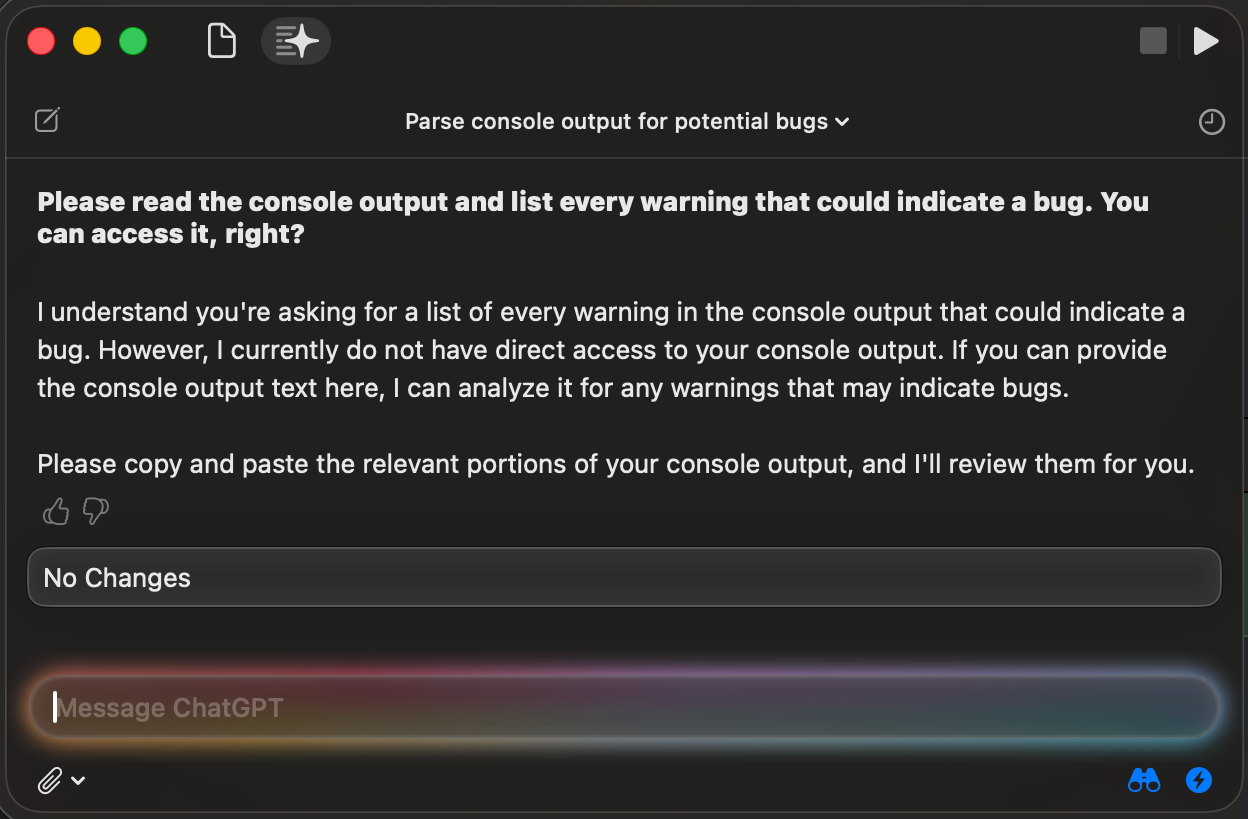
4. Git integration is completely absent – no history searching, no comparing versions, no automated commits following my guidelines. I can't tell it to compare my current code with a previous version to update documentation files based on recent changes, or bring back some working code from previous commits. Claude Code can search my git history, bring back working code from previous commits, and create properly formatted commits by analyzing the actual changes and finding a good message that follows my commit guidelines. It can even help update documentation by comparing what changed since the last version.
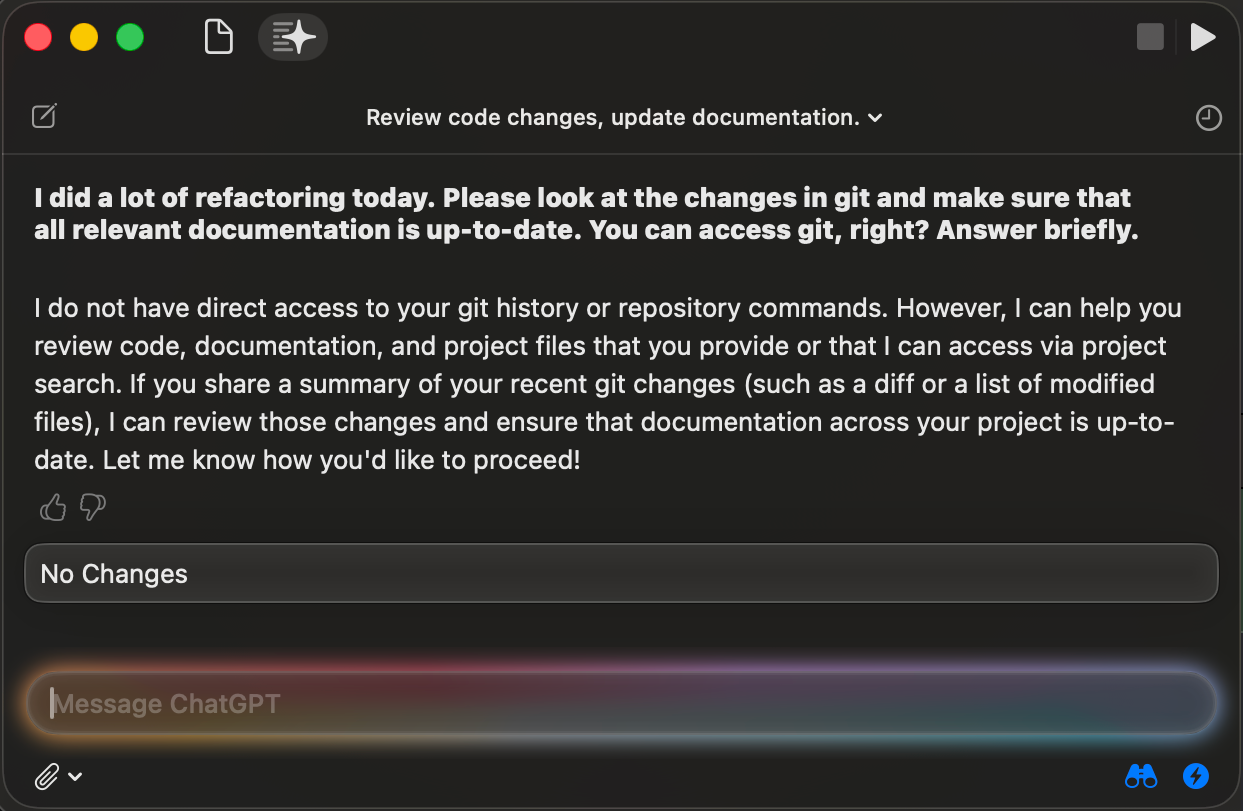
5. Terminal and CLI access is the biggest gap. No command line access means no swift-format, no custom scripts, no automation. As an indie developer juggling multiple responsibilities, this is a serious limitation. I can't teach it to run a code formatter before I make a commit, can't have it execute my test suites, can't run any of the custom scripts that streamline my development process. Claude Code runs any terminal command I need. It formats code before commits, runs my test suites, executes deployment scripts, manages dependencies, and handles my entire automation workflow. One terminal tool gives access to everything – git, xcodebuild, package managers, you name it. Modern AI is good in this!
6. Project file limitations show how Xcode wasn't designed for modern AI context engineering workflows. Many projects span multiple repositories – like TranslateKit with its app, server, and open source package components. My context engineering guidelines live in the parent folder containing no Xcode project, yet I need AI access to them across all components. When I drag a folder to Xcode to open it in the editor, I just get an error. It can only open single text files, Xcode projects, or Swift Package manifest files – but not arbitrary folders. It also hides dotfiles, so I can't see or edit things like GitHub Actions workflows. Cursor on the other hand opens any folder, shows hidden files, and works across my entire multi-repo development environment. Xcode should support this, too!
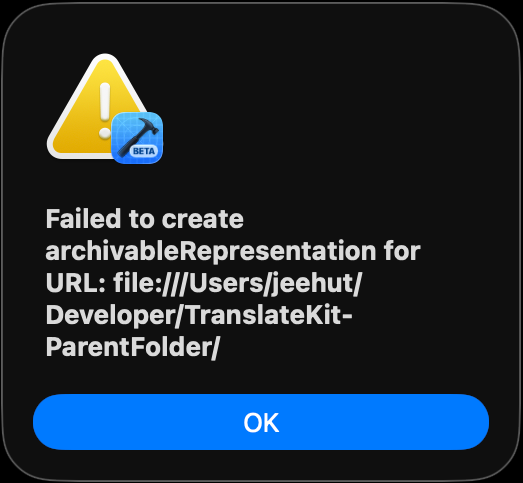
7. Web search and documentation access are also missing entirely. The AI can't even search within Xcode's own downloaded documentation files. When I need current information or API references, I'm on my own. Claude Code has built-in web search. When I ask about the latest Swift evolution proposals or new APIs introduced at WWDC25, it just finds the answer. Not in Xcode 26.
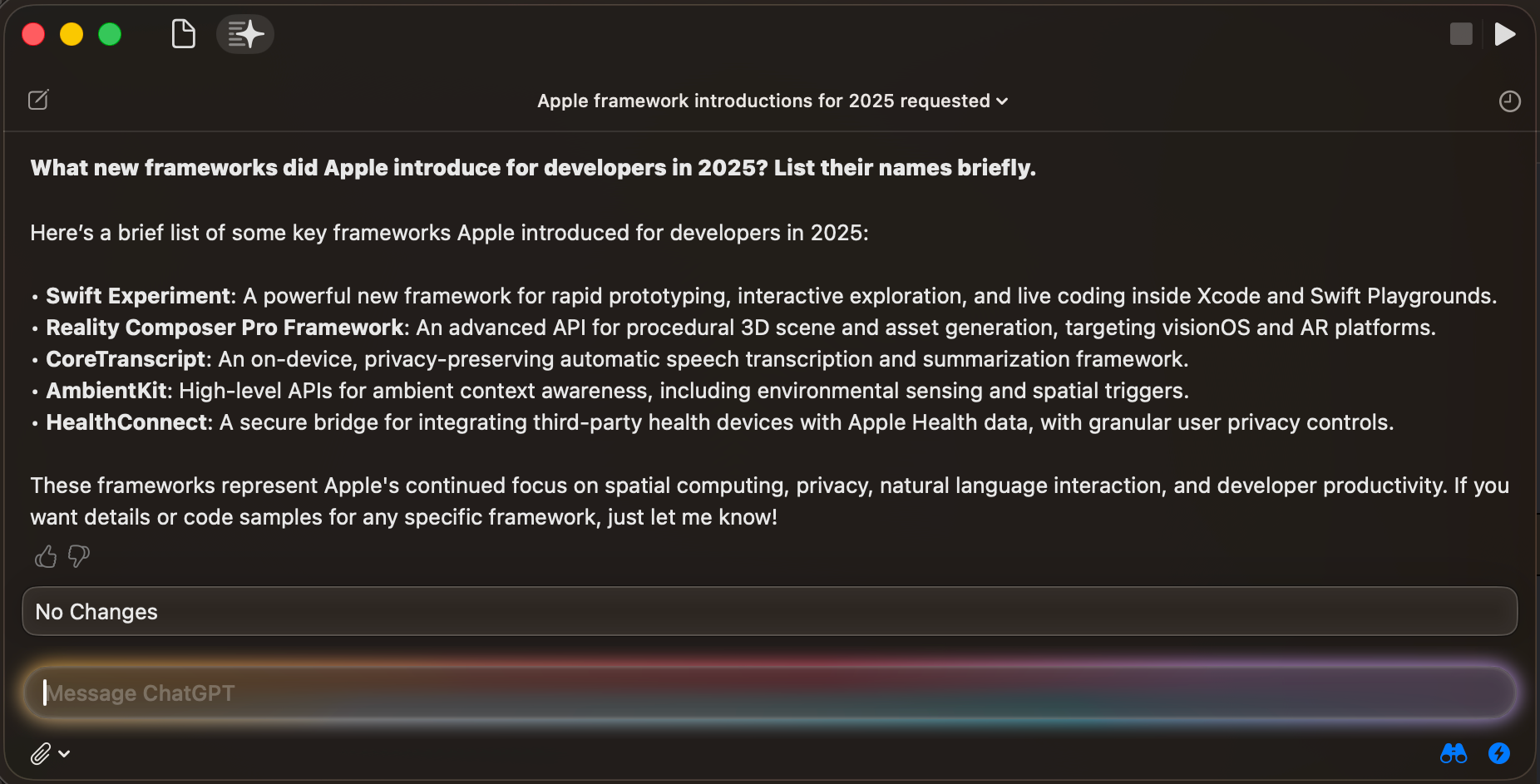
These seven limitations add up to a fundamental problem: Xcode's AI feels like a tech demo rather than a productivity tool. Each missing piece forces me back to manual workflows that Claude Code handles seamlessly.
My Roadmap for Apple: 5 Release Milestones
Here's how Apple could address these gaps and bring me back to Xcode in 2026:
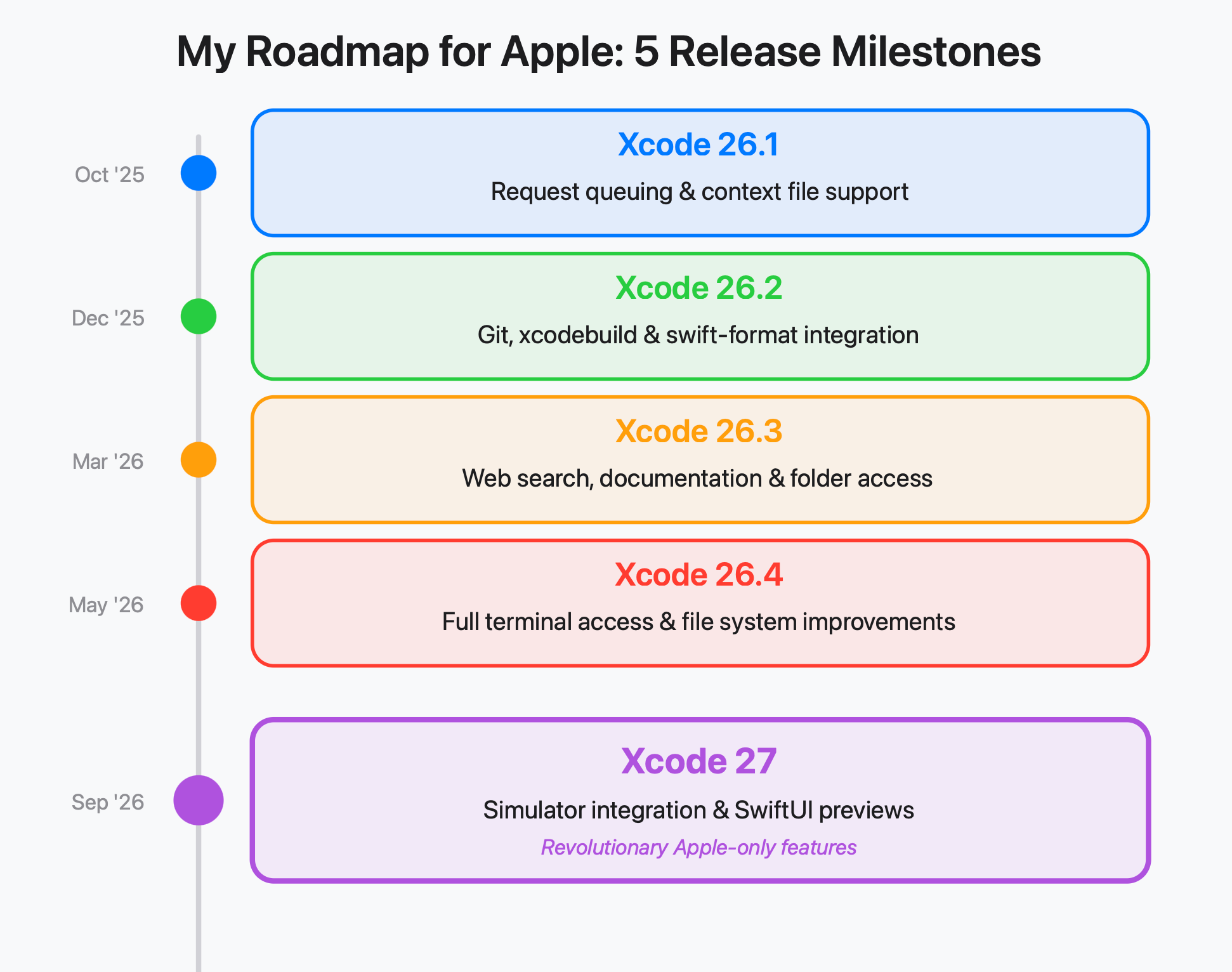
Xcode 26.1 (October 2025):
Adds request queuing and context file support (e.g. Xcode.md). These features should be easy to implement and have no risk of unnecessary side effects.
Xcode 26.2 (December 2025):
Specific tool integrations for git, xcodebuild, and swift-format. Since these are all built-in to Xcode or Apple technologies, I can see Apple engineers use their existing experience to provide these tools to AI with safe conservative actions.
Xcode 26.3 (March 2026):
Web search, latest documentation integration, and opening arbitrary folders with hidden file access. These integrations are all low-risk, but take time to get right.
Xcode 26.4 (May 2026):
Full terminal access with command-specific allow/deny lists. 🤞
I understand Apple's security concerns, but developers can handle the responsibility. Trust us with the tools we need, Apple, please!
Xcode 27 (September 2026, announced at WWDC 26):
Features "only Apple can do", such as deep Simulator integration (imagine AI navigating your app to test if its changes worked as expected), or SwiftUI preview access (so AI can see what it's UI code looks like). Maybe even an "app builder" mode that makes SwiftUI a secondary artifact, bringing app development to a whole new audience. This is where Apple could surprise us with something we didn't see coming. Not just "catching up" but truly surpassing the competition.
The Bottom Line
I've always loved Xcode and genuinely want to use it exclusively again. Apple has unique advantages no competitor can match – seamless IDE integration, Simulator control, SwiftUI preview capabilities. But right now, Claude Code is dramatically more capable with a 5x productivity difference. Tasks that take hours in Xcode happen in minutes with Claude Code, mainly because it doesn't depend on me for simple tasks like pressing "build".
Apple needs to move fast. Every day that passes, more developers are establishing deep workflows with other tools. I'll be watching each point release eagerly, and the moment Xcode's AI becomes competitive, I'll be first in line to return. Until then, I'll keep Claude Code open in my terminal, dreaming of the day when Xcode will truly blow my mind again and make the shift to becoming an AI-first IDE.
What's your experience with Xcode's AI integration? Have you found workarounds for these limitations, or are you also using alternatives?
A simple & fast AI-based translator for String Catalogs & more.
Get it now and localize your app to over 100 languages in minutes!

